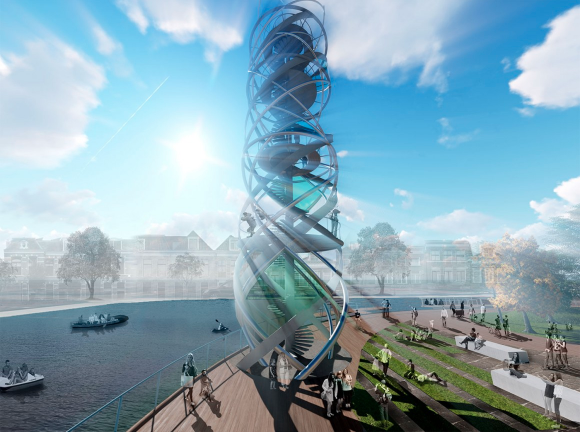International exhibition puts sustainability at the heart of design

The University of Melbourne is launching an exhibition of international work on sustainable urban design, in a program known as Eco-Acupuncture, helping communities ‘future-proof’ their cities for the impact of climate change.
Led by academics from University’s Victorian Eco Innovation Lab (VEIL) in the Melbourne School of Design, the Walking on Water exhibition showcases four years of design work and sustainable urban interventions for two cities in the Netherlands, Rotterdam and Leeuwarden.
VEIL was hired by the cities of Rotterdam and Leeuwarden and the EU Cultural capital program to identify sites within the cities that will be critical for negotiating a path to a resilient low-carbon future.
VEIL researchers and around 100 Masters program students worked in Melbourne and visited the Dutch cities to establish design studios that open for three weeks each year.
Walking on Water presents a series of architecture and design interventions for those sites, created in partnership with students from the Technical University of Delft and the Aalto University Design Factory in Leeuwarden.
These innovative solutions, co-developed with the city communities, act as starting points for future development.
VEIL Director Professor Chris Ryan said this research has given space for young ideas and positioned our students as leaders in the design community.
“Our students have responded to real-world problems and worked with local communities in the Netherlands to design sustainable interventions. For the city of Leeuwarden, those designs have been incorporated in its huge development plan for 2018 when it is the Cultural Capital of Europe,” Professor Ryan said.
“This experience has allowed our students to compete on a global stage, having worked with ambitious and imaginative governments on pressing sustainability issues.
“Our students have had the opportunity to learn from a country that puts sustainability issues at the heart of new design projects, incorporating VEIL’s understanding of the challenges that cities face as the climate changes.”
Wybren Jorritsma, visiting from Fryslân in the Netherlands and senior project manager of the Leeuwarden 2018 Cultural Capital program said the Eco-Acupuncture designs address the challenges and opportunities facing their cities.
"Together with the VEIL team, designs for the future have been made,” Mr Jorritsma said. “It’s an interesting mix of daring to dream and daring to act.”
The exhibition launches on Wednesday, 25 October at the Melbourne School of Design, with an oration from Sascha Glasl, co-founder of the ground-breaking Amsterdam architectural practice, Space&Matter.